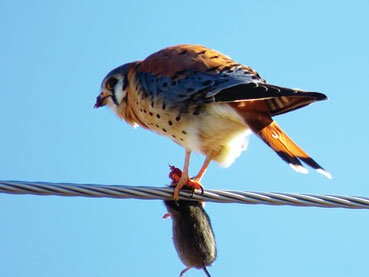
Photo courtesy Charles Martinez
This week’s Bird of the Week, compliments of the Weminuche Audubon Society and Audubon Rockies, is the American kestrel.
The smallest falcon in North America is one of the most vibrantly colored of all raptors. The northern race male wears slate blue on his head and wings, rufous feathers with black spots over his back, and a rufous-colored tail ending in a black band. The larger female is more subtly shaded with rusty-colored barred feathers. Both sexes have two black malar stripes on the face and the slender, pointed wings, long tail and slender body typical of falcons.
American kestrels are birds of open country, preferring grasslands and shrublands with a high perch available from which to see their entire territory. They are one of the few birds whose numbers have benefited from forest clearing in South and Central America.
They are often seen perched on electric wires, scanning the ground below. False “eye spots” on the back of the head wards off predators who might otherwise attack from the rear.
Using excellent vision to spot prey on the ground, they primarily feed on medium to large insects, but will also catch lizards, snakes, mice and small birds, which they consume at the perch. Surplus kills are hidden for later consumption. The capability to see ultraviolet light reflected in rodent urine trails can lead them to a meal.
American kestrels are secondary cavity nesters and a lack of suitable cavities will limit reproduction. In the right habitat, they have adapted well to nesting in human-made nest boxes.
Data from a number of sources has shown a sharp population decline in these birds since the 1960s, nearly a 50 percent drop in North America. The reason is unclear. In 2012, the Peregrine Fund launched the American Kestrel Partnership to enlist the help of citizen scientists in monitoring nest success at constructed nest boxes. Information on these birds and the project, including how you can participate, can be found at kestrel.peregrinefund.org/home.
For information on events, visit www.weminucheaudubon.org and www.facebook.com/weminucheaudubon/.